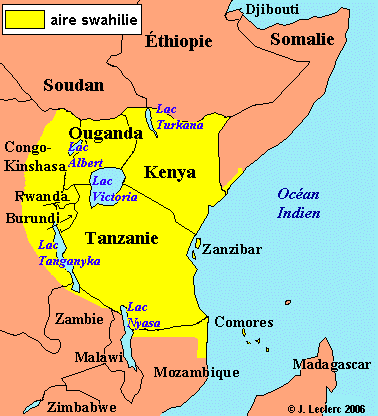Swahili
About Swahili
Karibu!
(Welcome; Commonly used word in Swahili culture.)
Swahili At a Glance
Also referred to as: Kiswahili
Spoken in: Tanzania, Uganda, Kenya, the Democratic Republic of Congo, Burundi, Rwanda, Mayotte, Mozambique, Somalia as well as outside Africa.
Number of Speakers: Over 100million globally.
First written: AD 1711
Writing system: Arabic script, Latin script
Status: Lingua Franca in Eastern and Central Africa. Official language in Tanzania (where it is also the national language), Kenya, Uganda, the African Union and Comoros where it is known as Comorian. National language in the DR Congo.
Fun Fact: Jambo is not a real word in Swahili. Foreigners mispronounced “Hujambo” so often that it ended up sticking.
Introduction:
Swahili is a Bantu language, influenced by Arabic.
It is the official language of Tanzania and Kenya.
Swahili is also widely spoken in Uganda, the DR Congo, and on the Comoros Islands. You’ll still find Swahili speakers in Mozambique, N. Zambia, Rwanda, Malawi, and Burundi. Around 100 million people speak Swahili globally; however a smaller 2 million learn it as first language.
From Stream Africa.
Origin:
Swahili is derived from the Arabic word سَوَاحِل (sawāḥil) which is the plural of سَاحِل (sāḥil – boundry, coast). سَوَاحِل (sawāḥil) means “coasts”. The prefix ki – is added to the noun to make it Kiswahili which means “coastal language”. Kiswahili heavily borrows from Arabic, Portuguese, German and other European and Asian languages due to contact with traders. The language was heavily influenced by Arabs and Persians who moved to the coast of East Africa. When speaking Swahili, recognize that you often will not find direct translations of words, or especially in syntax.
Some Facts:
- You are probably more familiar with Swahili than you think. For example, “safari” is a trip. “Rafiki” (which you may hav heard in the Lion King) means “friend.” “Simba” is a lion. And, “jenga” means “build.”
- Swahili is fairly intuitive to learn at the beginning stages, as it’s phonetic. However, the challenges are bound to develop as you work through complex sentences and ideas.
- Jambo is not a real word! Tourists mispronounced “Hujambo” (a greeting) so often that it stuck. The correct response to “Hujambo?” is “Sijambo.” It literally translates to “do you have any worries?;” “No I don’t have any worries.
Importance of Swahili:
Swahili historically has been an important language in East Africa and continues to play a significant role in the region today. Swahili serves as a lingua franca between the handful of countries mentioned above in that common knowledge of the language aids in trade, supports the transfer of oral and written tradition and culture, and unites people around a shared social identity. The many international interactions in East Africa have also shaped Swahili culture and language, dating back to the second century A.D. when trade commenced with Arabs and Persians. Other languages in addition to Arabic that have been incorporated into the Swahili language over time include Portuguese, English, and German.
Swahili continues to have great significance in East African countries in contemporary times as well, especially as an official language in Kenya and Tanzania. Swahili was adopted by the first President of Kenya, Jomo Kenyatta, as an official language in 1970 to displace the use of the English language that had been widely spread through the education and governing system by the British colonial administration. Similarly, the first President of Tanzania, Mwalimu Julius Nyerere, embraced Swahili through his policies that sought to achieve national social cohesion and pan-African unity through the shared Swahili culture and language. Today, Swahili is the primary language used in the Tanzanian government and primary education, and in Kenya it is used as more of a secondary language (to English). Swahili has also been taken up as a pan-Africanist symbol of Black identity by the diaspora, such as in the 1960s Black Power movement in the United States.
Works Consulted
African Studies Institute at the University of Georgia, Kiswahili Kwa Komputer, http://www.africa.uga.edu/Kiswahili/doe/kiswahiliabout.html
Ali, Hassan O. Swahili Language and Culture, http://www.glcom.com/ hassan/swahili_history.html
Herrington, Olivia. “A Language of Their Own: Swahili and Its Influences.” (2015). Harvard Political Review. p://harvardpolitics.com/books-arts/swahili-language-influence/
“Swahili.” The National African Language Resource Center (NALRC). University of Wisconsin-Madison, WI. https://www2.ku.edu/~kiswahili/pdfs/intro.pdf
“Swahili language.” (2017). Encyclopædia Britannica. ttps://www.britan nica.com/topic/Swahili-language
Lonely Planet’s Swahili Phrasebook by Martin Benjamin, Charles Mironko, and Anne Geoghegan.
Omniglot, The Online Encyclopedia of Writing Systems and Languages, http://www.omniglot.com/writing/swahili.htm
The Language Gulper, http://www.languagesgulper.com/eng/Swahili.html


